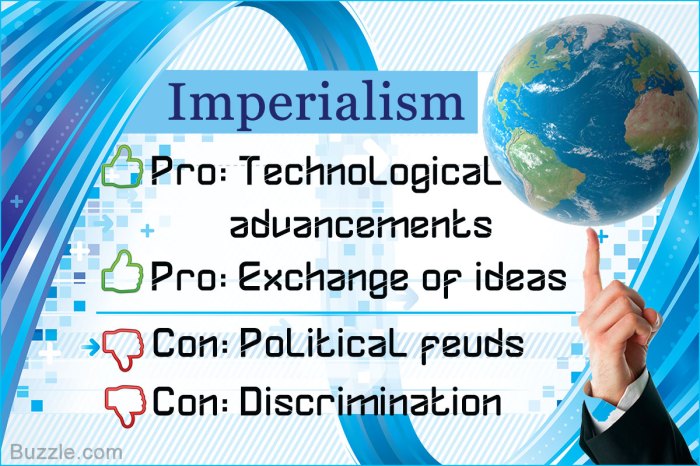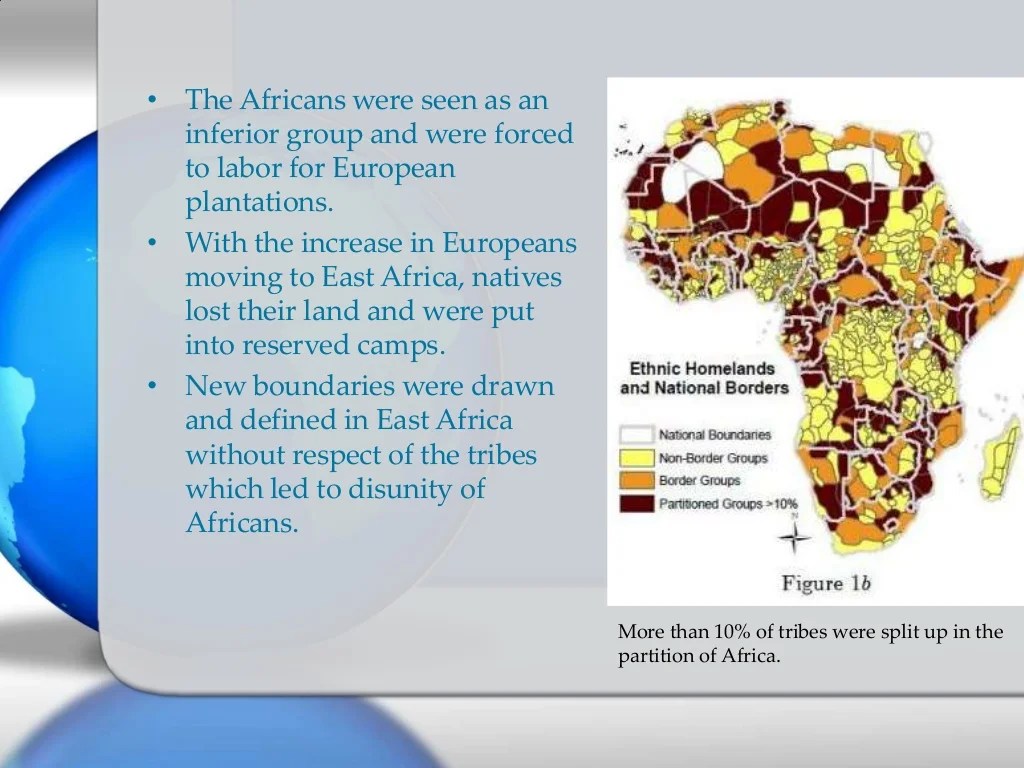The multifaceted topic of pros and cons for imperialism sets the stage for this enthralling narrative, offering readers a glimpse into a story that is rich in detail and brimming with originality from the outset. Exploring both the advantages and disadvantages of this complex phenomenon, this article delves into the political, economic, social, cultural, and ethical implications of imperialism, providing a comprehensive analysis that sheds light on its profound impact throughout history.
From the expansion of empires to the exploitation of resources, the effects of imperialism have left an enduring mark on societies worldwide. This article examines the intricate web of consequences, both positive and negative, that have shaped the course of human history and continue to resonate in contemporary international relations.
Political Impacts

Imperialism offers advantages for expanding political power and influence. It enables nations to establish new colonies, increasing their territorial control and global presence. The British Empire, for instance, expanded its influence across continents, establishing colonies in Asia, Africa, and the Americas.
Imperialism also allows nations to assert their dominance in international affairs, influencing global politics and decision-making.However, imperialism also brings negative consequences. It often leads to the loss of political autonomy for colonized regions, as they become subject to the rule of imperial powers.
Local cultures and political systems may be suppressed or replaced, eroding the identity and self-determination of colonized peoples. Examples include the suppression of indigenous languages and customs during European colonization.
Establishment of Colonies
Imperialism has led to the establishment of numerous colonies worldwide. European powers, such as Britain, France, and Spain, established vast colonial empires during the 19th century. These colonies provided access to resources, markets, and strategic territories, bolstering the political and economic power of imperial nations.
Expansion of Empires
Imperialism has facilitated the expansion of empires, enabling nations to extend their reach and control over vast territories. The Roman Empire, for instance, expanded from the Italian Peninsula to encompass much of Europe, North Africa, and the Middle East. Imperial expansion often involved military conquest and the imposition of imperial rule over conquered regions.
Loss of Political Autonomy
Imperialism often results in the loss of political autonomy for colonized regions. Imperial powers establish their own political systems and laws in these regions, suppressing or eliminating local political structures. The Indian subcontinent, under British rule, lost its political independence and became subject to British colonial administration.
Suppression of Local Cultures
Imperialism can lead to the suppression of local cultures. Imperial powers may impose their own cultural values, languages, and customs on colonized regions, eroding local traditions and identities. The Spanish Empire, during its colonization of the Americas, suppressed indigenous languages and religions, imposing Spanish as the official language and Catholicism as the dominant religion.
Economic Impacts: Pros And Cons For Imperialism

Imperialism has had profound economic impacts on both colonizing and colonized regions. While it has contributed to economic growth and resource acquisition, it has also led to exploitation and dependency.
Benefits of Imperialism for Economic Growth and Resource Acquisition
Imperialism has often driven economic growth in colonizing countries. The acquisition of new territories and resources has provided access to raw materials, new markets, and cheap labor. This has fueled industrialization and economic expansion.For example, the British Empire’s control over India provided access to vast cotton plantations, which became a major source of raw materials for the British textile industry.
Similarly, the French Empire’s expansion in Africa led to the acquisition of rubber, diamonds, and other valuable resources.
Negative Economic Impacts of Imperialism
However, imperialism has also had negative economic consequences. The disruption of local economies and the establishment of economic dependency have often hindered the development of colonized regions.Imperial powers often disrupted traditional economic systems in colonized territories, leading to unemployment and poverty.
They also imposed economic policies that favored the colonizing country, such as tariffs and monopolies, which stifled local economic growth.For example, the Dutch East India Company’s monopoly on the spice trade in Southeast Asia prevented local producers from competing, leading to economic decline in the region.
Similarly, the British Empire’s policy of forced cash crop cultivation in India led to the neglect of food production, resulting in famines.
Social Impacts

Imperialism has had a profound impact on the social fabric of colonized regions, both positive and negative.
Positive Impacts
Imperial powers often introduced new technologies and ideas to their colonies, leading to improvements in infrastructure, healthcare, and education. For example, the British Empire introduced railroads, telegraphs, and modern medical practices to India, which had a significant impact on the lives of ordinary Indians.
Spread of Education and Healthcare
Imperialism also played a role in the spread of education and healthcare in colonized regions. Missionaries and colonial governments established schools and hospitals, which provided access to education and medical care for many people who would not have had it otherwise.
Negative Impacts, Pros and cons for imperialism
However, imperialism also had a number of negative social impacts. The disruption of traditional societies and the creation of social hierarchies were among the most significant.
Disruption of Traditional Societies
Imperialism often led to the disruption of traditional societies, as indigenous cultures and ways of life were replaced by those of the colonizers. This could lead to social conflict and a loss of cultural identity.
Creation of Social Hierarchies
Imperialism also created social hierarchies, with the colonizers at the top and the colonized people at the bottom. This could lead to discrimination and exploitation, as well as a sense of resentment and alienation.
Cultural Impacts
Imperialism has had both positive and negative impacts on culture. On the one hand, it has facilitated cultural exchange and the spread of knowledge. On the other hand, it has also led to the suppression of local languages and the imposition of foreign values.
Benefits of Imperialism for Cultural Exchange
Imperialism has led to the spread of knowledge and ideas between different cultures. For example, the British Empire introduced Western science and technology to India, while the French Empire introduced European art and literature to Vietnam. This exchange of ideas has helped to shape the cultural development of both the colonizing and colonized countries.
Negative Cultural Impacts of Imperialism
Imperialism has also had negative cultural impacts. One of the most common is the suppression of local languages. For example, the British Empire banned the use of Irish and Gaelic in Ireland, while the French Empire banned the use of Vietnamese in Vietnam.
This suppression of local languages has led to the loss of cultural diversity and the erosion of indigenous cultures.Another negative cultural impact of imperialism is the imposition of foreign values. For example, the British Empire introduced Christian missionaries to India, while the French Empire introduced Catholic missionaries to Vietnam.
These missionaries often sought to convert local people to their own religion, which led to the erosion of traditional beliefs and practices.
Imperialism has its ups and downs, like a truck weighing 3.0 x 10 4 . On one hand, it can bring economic benefits and technological advancements. On the other hand, it can lead to exploitation and political instability. Balancing these pros and cons is a delicate task that has shaped the course of history.
Ethical Considerations

Imperialism has raised ethical concerns due to its exploitation of indigenous populations and violation of human rights. The establishment of colonial rule often resulted in the subjugation and displacement of native peoples, depriving them of their land, resources, and cultural practices.
Historical Examples
Historical events like the colonization of Africa and the Americas provide stark examples of the ethical dilemmas posed by imperialism. European powers imposed their rule on indigenous societies, leading to the exploitation of labor, forced assimilation, and the disruption of traditional ways of life.
These actions resulted in immense suffering and loss for the affected populations.
Ongoing Debates
The legacy of imperialism continues to be debated today. Some argue that imperialism brought modernization and infrastructure to colonized regions, while others emphasize the negative consequences, such as cultural destruction and economic exploitation. These debates shape contemporary international relations, as former colonies seek reparations and address the ongoing impacts of historical imperialism.
Q&A
What are the main advantages of imperialism?
Imperialism can lead to the expansion of political power and influence, economic growth and resource acquisition, the introduction of new technologies and ideas, and cultural exchange.
What are the main disadvantages of imperialism?
Imperialism can result in the loss of political autonomy, the suppression of local cultures, the disruption of local economies, the creation of economic dependency, and the exploitation of indigenous populations.
How has imperialism impacted contemporary international relations?
Imperialism has left a lasting legacy that continues to shape international relations, including issues related to post-colonialism, neocolonialism, and the global power dynamics between developed and developing nations.
